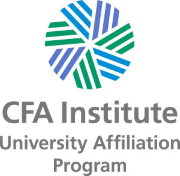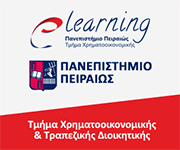Regulation of Financial Markets
Course Name: Regulation of Financial Markets
Teachers: Panagiotis Staikouras
School: Finance and Statistics
Department: Banking and Financial Management
Level: Undergraduate
Course ID: ΧΡΘΠΧ01 Semester: 1st
Course Type: Core Course
Prerequisites: –
Teaching and Exams Language: Greek
Course Availability to Erasmus Students: No
Course webpage: https://eclass.unipi.gr/modules/document/?course=FAS102
Specific Teaching Activities |
Weekly Teaching Hours |
Credit Units |
Lectures |
4 |
7,5 |
Course Content
Course Content
- Financial system: introduction (how the financial system impacts on our everyday life, constituent elements of the financial system)
- Money and payment system
- Financial instruments (eg, stocks, bonds, units/shares of collective investment schemes, derivatives, insurance contracts): their basic characteristics and use
- Financial markets: their structure and role
- Financial institutions-intermediaries (eg, credit institutions, insurance companies, investment firms, collective investment schemes): their characteristics and function, with emphasis on analyzing the operation of credit institutions
- Supervision of the financial system and the rationale of financial regulation
- Central banks and EU banking union
Teaching Results
The general objective of the course is to present, in a comprehensive and intelligible manner, the principles underlying the legal framework of financial markets. More specifically, the course provide students with the necessary background to comprehend the basic functions, structure and regulation permeating financial markets and institutions, the fundamental economic rationale and legal setting of financial instruments, the core supervisory structure of financial markets in national and European Union level, as well as the reasons of and the institutional response to financial crises.
Skills
Analytical skills and critical thinking
Deductive reasoning
Ability to place facts within the scope of rules
Development and supporting of arguments in order to resolve problems
Creative thinking
Teaching and Learning Methods - Evaluation
Lecture: Ιn Class
Use of Information and Communication Technologies: All teaching material (eg. Power Point lectures, case studies) are uploaded to: https://eclass.unipi.gr/modules/document/?course=FAS102
Teaching Analysis:
Activity |
Semester Workload |
Power point lectures |
52 |
Students’ reading |
135.5 |
Total |
187.5 |
Student Evaluation:
Students’ evaluation takes place in the Greek language. Students are required to produce concise but at the same time comprehensive answers to four (4) questions (also using an example (or examples), in order to ensure students’ deep undemanding and uptake). In addition, students are required to answer six (6) multiple choice questions. Scoring of the open and multiple choice questions is set out in the exam paper.
Considering that:
(a) all exam questions are derived from topics that have been extensively discussed in the class,
(b) the power-point lectures are extremely comprehensive, also comprising examples to facilitate students’ understanding and reading,
(c ) in order to provide further guidance and assistance, supplementary material comprising articles and reports is also distributed to students (along with the books recommended),
it becomes patent that students are fully aware not only of the appropriate method to address the exam questions but also the evaluation criteria that are adopted.
Recommended Bibliography
– Προτεινόμενη Βιβλιογραφία:
- Gortsos, “Introduction to the International Financial Law: the International Banking Law in the context of the International Financial Law» (Nomiki Vivliothiki, 2011)
- Cecchetti S., Schoenholtz K., «Money, Banking and Financial Markets» (Paschalidis Publishers και Broken Hill, 2015)
- Distribution to students of additional, supplementary material which comprises articles and reports




